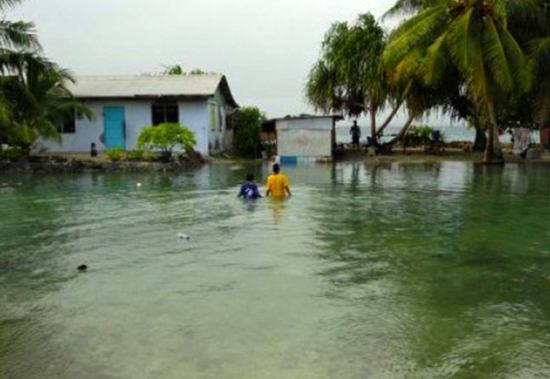
How the Pacific microstates are facing up to climate change. John Vidal of The Observer reviews the Pacific Islands Forum in the Marshall Islands.
COMMENTARY: Pacific islanders challenged world leaders this week to act on climate change, warning that their low-lying atolls are close to becoming uninhabitable because of rising seas and increasingly severe floods, droughts and storm surges.
“The Pacific is fighting for its survival. Climate change has already arrived,” said Christopher Loeak, President of the Marshall Islands, which host the Pacific islands’ annual summit, attended by most of the world’s largest emitters of greenhouse gases, including the United States, China and the European Union.
The Marshall Islands, a group of 29 atolls and coral islands standing on average only two meters above sea level, and lying halfway between Australia and Hawaii, is particularly vulnerable to climate change.
Earlier this year the president declared a state of emergency following a simultaneous drought and some of the worst floods ever experienced. A freak tide nearly destroyed the capital Majuro, breaching its sea walls and flooding the airport runway. The drought left 6000 people surviving on less than 1 litre of water a day.
Many other small island Pacific “microstates,” including the Solomons, Tuvalu and the Carteret Islands, have all suffered rapid erosion, higher tides, storm surges and inundation of wells with seawater.
Earlier this year Kiribati’s President, Anote Tong, predicted his country was likely to become uninhabitable between 30 and 60 years from now because of inundation and contamination of its freshwater supplies.
Many of its outer islands are being invaded by the sea and people are flocking to the capital, South Tarawa. The state has plans to buy 2000 hectares of land in Fiji to grow food for itself and possibly to act as a new island home.
'Real issue for himanity'
“I say ‘welcome to climate change’ when people come here,” said President Loek whose home island of Buoj has almost been washed away in the last few years. “We will not stop telling people that it is a real issue for humanity. We will be the first to feel it, but it will come to them and they should realise it.”
The Marshalls and most other Pacific states hope that their physical vulnerability on the frontline of climate change will help galvanise world leadership in the stalled UN climate talks. They expected all countries at the Pacific summit, including the US, China and the EU, to sign the Majuro Declaration of leadership that will focus attention on emission cuts before the expected resolution of the talks in 2015.
The declaration will be presented to the United Nations at the talks in Poland in November.
The islands, which produce less than 0.1 percent of the world’s emissions, say they are leading by example. Most have started to substitute the expensive diesel they must traditionally import to generate electricity with renewable energy, including coconut power — biodiesel derived from homegrown coconut palms to power cars and outboard motors.
The Marshall Islands has converted its outer island communities to solar energy and Tokelau has become the first territory in the world able to meet all its electricity needs with solar power. The Cook Islands and Tuvalu are aiming to get all of their electricity from renewable sources by 2020.
Many of the islands look to New Zealand, their closest large land mass, to give financial and diplomatic leadership.
“New Zealand can and should do more,” said President Loeak. “They are the fifth highest per capita emitters in the world and Kiwi emissions continue to climb.”
EU Climate Commissioner Connie Hedegaard pledged last week to support the Pacific island states at the summit. She said:
These low-lying islands risk being swamped by rising sea levels and their inhabitants forced to emigrate. Weather extremes in the Pacific are not about a distant future.
They have become the new normal. Heat waves, floods, droughts and rising oceans are the new reality of an ever warming world. And this should not come as a surprise. Scientists have been warning for years that as the planet heats up, we will have to deal with more severe, more changeable, more unpredictable weather.
The Pacific can count on Europe’s cooperation and ambition. We count on the Pacific region to help us bring all other major economies on board the future climate regime.
This work is licensed under a Creative Commons Attribution-NonCommercial 3.0 New Zealand Licence.




.jpg)
